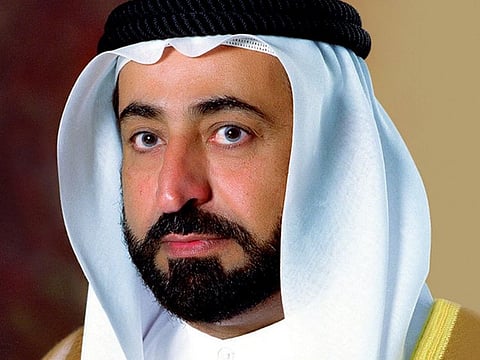Sharjah Ruler issues law to reorganise Sharjah Police
The law stipulates that the Sharjah Police Force is a regular civil body

Sharjah: His Highness Dr Sheikh Sultan bin Mohammed Al Qasimi, Supreme Council Member and Ruler of Sharjah, has issued a law reorganising Sharjah Police.
The law stipulates that the Sharjah Police Force is a regular civil body, whose executive management is affiliated to the General Command of Sharjah Police.
Dr. Sheikh Sultan is its supreme commander. The Sharjah police force is consisting of "military-officers, staff-warrant and Civil servants. The force's members are subject to legislation in force in the Emirate".
As per the law, the force, which will have its own flag and logo, aims to achieve and maintain public security, public order and public morals, as well as provide reassurance to all members of society in the emirate.
Its duties also include protecting lives, money, property, vital facilities and public amenities in the emirate. It will also be responsible for promoting and spreading a culture of respect for the law among community members and activate the community's role in preventing crime and reducing its risks.
The force is responsible for combating and preventing crimes and arresting perpetrators in accordance with the procedures and legislation in force in the emirate.
Its responsibilities also include regulating traffic and ensuring compliance with traffic rules, educating community members on the importance of respecting and adhering to legislation and public order. The force is also responsible for implementation of laws, regulations, decisions, regulations, instructions and procedures they are entrusted to implement them.
The law stipulates that the Commander-in-Chief of Sharjah Police shall manage the force and be responsible for performing his duties, tasks, and competencies before the Ruler or whomever he representatives, and he may exercise the necessary powers to manage its affairs and take the necessary decisions to achieve its goals, and he has in particular the following -
1- Proposing the general policy and strategic plans necessary to achieve the objectives of the Force, and submitting them to the Executive Council for approval or taking the necessary action in this regard.
2- To propose draft laws and decisions related to the force’s objectives and powers, and to present them to the Executive Council to decide what it deems appropriate in their regard.
3- Supervising the workflow of the Force in accordance with the legislation and regulations in force, issuing the necessary administrative decisions and following up on their implementation.
4- Controlling and managing spending on power from the budget approved by the government.
5- Creation of organisational units for the force based on the approval of the ruler or whoever representatives him.
6- Forming permanent and temporary committees and working groups affiliated with the force and defining their functions and system of work.
7- Representing the force in the competent committees and in local, federal, regional and international meetings, in its communications and correspondence, in its relations with others and before the judiciary.
8- Assigning some of his powers or competencies to the senior leadership of the Force's members in accordance with the legislation in force in the Emirate.
9- Any other duties or functions assigned to it by the Ruler or the Executive Council.
In accordance with the law, military members of the force, in order to carry out their duties, have the right to use force to the extent necessary to carry those duties whenever needed, and are entitled to carry weapons handed over to them under their function, and their use of weapons is limited to the following conditions:
1- Legitimate defence of oneself, honour, money, or others
2- The arrest of any person against whom an arrest warrant was issued, if he resisted or tried to flee.
3- The arrest of any person who has the power to arrest him according to the legislation in force if he resists or tries to flee.
4- The arrest of any prisoner if he resisted or tried to escape.
5- Breaking up any unlawful gathering if its purpose is to commit a crime or endanger public security or public order, and that is if the gathering does not comply after being warned in the possible ways, provided that the order to shoot is issued by a person authorised to do so.
The law stipulates that the use of firearms shall be stipulated in the cases stipulated in Article 9 of the following law.
1 - Shooting should be the only means of preventing danger after verifying that it is carried out, with the intention of disabling the target of this weapon from assault or resistance, and to be necessary and proportionate to the danger at the discretion of the conduct of matters.
2- There is no other way or method for dealing with the situation being tackled.
3- Start with a warning to shoot, then shoot in the air whenever possible.
4- Take into account that the shooting is not killing in order to control and arrest the wanted person.
5 - Only if the situation is feared to cause death or serious wounds should be corrected, and this fear has reasonable reasons. Taking into account Federal Law No. 35 of 1992 issuing the Code of Criminal Procedure and its amendments, in their jurisdictions, judicial officers are charged with describing their officers and personnel for crimes in their jurisdictions relating to their functions.
A decision by the Minister of Justice may authorise those not mentioned in the previous paragraph of this article to be appointed by members of the Force as judicial officers for crimes in their jurisdiction that are related to the work of their functions under the laws in this regard.
Sign up for the Daily Briefing
Get the latest news and updates straight to your inbox








